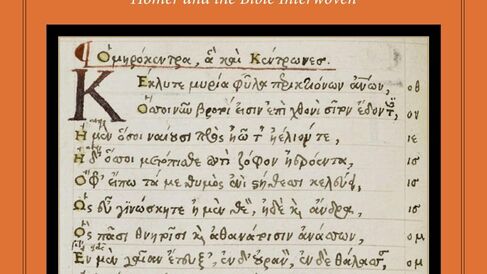to
Faculty of Divinity, Sidgwick Site (Cambridge) and online via Zoom

About
Was Homer a Christian ‘theologian’? Could pagan gods and heroes express nascent Nicene faith?
The Cambridge Interfaith Programme welcomes Dr Anna Lefteratou, Senior Lecturer in Patristics at the Faculty of Divinity, University of Cambridge, with a launch for her book, The Homeric Centos: Homer and the Bible interwoven (OUP, 2023).
Introducing The Homeric Centos
A 5th-century CE poem, The Homeric Centos is Homeric in style and biblical in theme. It illustrates the creative cultural and religious dialogue between Classical Antiquity and Christianity in the Roman Empire.
The text is attributed to Eudocia, empress and poet, who died in exile in the Holy Land ca. 460. With lines drawn verbatim from Homer's Iliad and Odyssey, the poem begins with the Creation and Fall and ends with Jesus' Resurrection and Ascension.
In this blend of Homeric style and Christian themes, there are also echoes of Classical and classicising literature, stretching from Homer and drama to imperial literature. Equally prominent are echoes of earlier Christian canonical and apocryphal works, verse models, and theological works.
Anna Lefteratou’s new book is the first full-length study of Eudocia’s poem. Her distinctive focus examines the double inspiration of the poem by both classical and Christian traditions.
What is the poem’s relationship with the cultural milieu of the 5th-century CE? How does it treat the different biblical scenes? Lefteratou’s in-depth analysis exposes the work’s debt to centuries of Homeric reception and interpretation as well as Christian literature and exegesis. The Homeric Centos is placed firmly at the crossroads of Christian and pagan literary traditions.
About this event
For this special event, author Dr Anna Lefteratou will be joined in conversation by Dr Aaron Pelttari (University of Edinburgh), Dr Emma Greensmith (University of Oxford) and Dr Daniel Weiss (Cambridge), to explore the theological and cultural impact of epic poetics on the cusp of Classicism and Christian faith.
About the author
Dr Anna Lefteratou is Lecturer in Patristics/Religions of Late Antiquity at the Divinity Faculty in Cambridge. Lefteratou studied Classics in Athens, La Sorbonne, and Oxford, from where she received her DPhil. Her first monograph on the Greek novels was published with DeGruyter (2017). After her DPhil she held two prestigious post-doctoral fellowships in Germany that allowed her to specialize in late antique literature.
Lefteratou is interested in the intercultural and interreligious dialogue between Hellenism and Christianity in the Roman Empire. Her second book, The Homeric Centos (OUP, 2023) is the only monograph dedicated exclusively on the Greek centonic poetics of the empress Eudocia, one of the rare female poets of Antiquity. She has contributed edited volumes, chapters, and articles on various aspects of late antique poetry and exegesis and is currently working on a new project on aspects of the tragic in Christian late antique poetry.
About the guest panellists
Dr Aaron Pelttari is a Senior Lecturer in Latin literature at the University of Edinburgh. He joined the Classics department there as a Chancellor’s Fellow in 2014, after a couple of teaching jobs in the USA, where he completed his PhD at Cornell University in 2012. He has published a commentary on the Psychomachia of Prudentius, which he uses regularly in teaching.
Pelttari’s first book, The Space That Remains, outlines an important shift in Latin letters of the fourth century, as poets increasingly wrote for strong or active readers. He recently submitted, with his co-editor Gavin Kelly, the forthcoming Cambridge History of Later Latin Literature. He has also written chapters and articles on various topics including Prudentius, paratexts, and the writing of Greek in late antique Latin manuscripts. Among other projects, he is working now on a short monograph on late antique Latin epic.
Dr Emma Greensmith is Associate Professor in Classical Languages and Literature at the University of Oxford. Before going to Oxford, she held a Research Fellowship at Jesus College, Cambridge. Before then, she was Visiting Assistant Professor of the Classics at Colgate University, New York. She completed her undergraduate and postgraduate work at Peterhouse, Cambridge. Her research centres on two areas: Greek epic in the broadest sense, and the poetics and politics of the Greek imperial period.
Greensmith is particularly interested in the continuation and transformation of epic in Late Antiquity, the effects of religious change on literary culture, and the relationship between ‘classical’ and ‘Christian’ canons. Her first book, The Resurrection of Homer (CUP, 2020), explored the reception of Homer in imperial Greek epic and the impact of this reception on Greek identity politics during Roman rule. Her latest book, Homer and the Bible: Essays on Christian Greek Epic, continues and expands this work into new literary spaces.
Dr Daniel Weiss is Polonsky-Coexist Senior Lecturer in Jewish Studies at the Faculty of Divinity, University of Cambridge. Dr Weiss took up his post in the Divinity Faculty in 2010, after previously teaching at the University of Virginia and at Oberlin College. He earned his PhD at the University of Virginia, after having received his Bachelor’s degree from Princeton University and a Masters of Theological Studies degree from Harvard Divinity School. He is also co-leader of the Scripture & Violence project, which explores common assumptions about the relationship between scriptural texts and real-world acts of violence.
Practicalities
This event is free to attend. There will be a drinks reception immediately after, kindly co-sponsored by the Faculty of Divinity with the Cambridge Interfaith Research Forum.
The event will be livestreamed on Zoom. If you would like to attend online, please fill out the registration form below so that we can send you the joining information.
